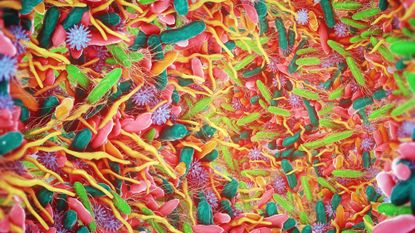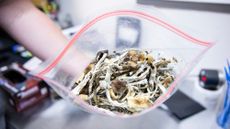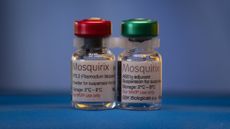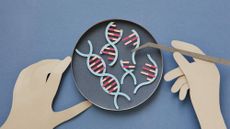What's the microbiome and why is it so important?
Our bodies serve as vibrant ecosystems for trillions of microbes


While humans are living organisms in their own right, the human body is also a thriving ecosystem for a number of bacteria, viruses and microbes. The human microbiome plays a vital role in our health, affecting the well-being of our immune and digestive systems, heart and brain. However, researchers are still learning about the range of influences the microbiome has on the human body.
What is the microbiome?
The microbiome is a "unique network of microbiota" — a bustling community of trillions of bacteria plus "fungi, parasites and viruses" — that's "originally determined by one's DNA," Harvard University's School of Public Health explained. For the most part, the microorganisms peacefully coexist, but the microbiome can run into problems if a person is suffering from an infectious disease, a dietary issue or environmental problems, or undergoes a long course of antibiotics. Microorganisms make up about 1% to 3% of our body mass, or the equivalent of 2 to 6 pounds of bacteria in a 200-pound adult.
Experts have long known about the benefits of the human microbiome, including producing certain vitamins we don't have the genes to make, helping break down food to extract nutrients, teaching our immune systems and producing compounds that fight off dangerous microbes. However, "the complex interplay between the trillions of microbes that inhabit our bodies and influence our health remains a biologic black box," according to Harvard Medical School.
Subscribe to The Week
Escape your echo chamber. Get the facts behind the news, plus analysis from multiple perspectives.

Sign up for The Week's Free Newsletters
From our morning news briefing to a weekly Good News Newsletter, get the best of The Week delivered directly to your inbox.
From our morning news briefing to a weekly Good News Newsletter, get the best of The Week delivered directly to your inbox.
Diet can play a large role in the microbiome. For example, "a high-fiber diet in particular affects the type and amount of microbiota in the intestines," wrote Harvard's School of Public Health. "Dietary fiber can only be broken down and fermented by enzymes from microbiota living in the colon," and that fermentation affects which microbes thrive or perish. When the gut microbiome is disturbed, it can affect our digestive system and how we break down food. This is why a long course of antibiotics can sometimes lead to temporary lactose intolerance.
Why is the microbiome important?
Understanding the microbiome can be crucial in expanding our knowledge of human health. "There are thousands of different bacteria, and even more unique small molecules that they produce," explained microbiologist Marco Jost of Harvard Medical School. "Each small molecule can, in principle, interact with lots of cell types in our bodies, and that triggers additional pathways that ultimately shape human biology."
Much research is being done regarding how the microbiome might both help fight disease as well as indicate the presence of disease. "An ever-growing number of studies have demonstrated that changes in the composition of our microbiomes correlate with numerous disease states, raising the possibility that manipulation of these communities could be used to treat disease," the National Institutes of Health (NIH) reported. Because the microbiome contains so many species of organisms and microbes, researching how it interacts with our bodies can prove to be challenging.
"Our main premise is that a lot of the effects of the microbiome on human health can be explained by small molecules from the microbiome acting at the level of human cell biology," Jost explained. "For example, through activating or inhibiting signaling pathways or by blocking certain chemical interactions." One of the biggest efforts to uncover the secrets of the microbiome is the Human Microbiome Project, whose mission is "generating resources that would enable the comprehensive characterization of the human microbiome and analysis of its role in human health and disease," the NIH wrote.
"The microbiome is essentially a window into new biology," Jost said, and it has "become clear that the microbiome is a global modulator of many aspects of human biology."

Continue reading for free
We hope you're enjoying The Week's refreshingly open-minded journalism.
Subscribed to The Week? Register your account with the same email as your subscription.
Sign up to our 10 Things You Need to Know Today newsletter
A free daily digest of the biggest news stories of the day - and the best features from our website
Devika Rao has worked as a staff writer at The Week since 2022, covering science, the environment, climate and business. She previously worked as a policy associate for a nonprofit organization advocating for environmental action from a business perspective.
-
 Today's political cartoons - December 3, 2023
Today's political cartoons - December 3, 2023Cartoons Sunday's cartoons - life expectancy goes up, Kissinger goes down, and more
By The Week US Published
-
 10 things you need to know today: December 3, 2023
10 things you need to know today: December 3, 2023Daily Briefing Gaza residents flee as Israel continues bombardment, Trump tells supporters to 'guard the vote' in Democratic cities, and more
By Justin Klawans, The Week US Published
-
 5 X-plosive cartoons about Elon Musk
5 X-plosive cartoons about Elon MuskCartoons Artists take on his proposed clean-up of X, his views on advertisers, and more
By The Week US Published
-
 4 tips for protecting your skin during winter
4 tips for protecting your skin during winterThe explainer The temperature drop could make anyone susceptible to dryer skin. Time to switch up your skin care routine.
By Theara Coleman, The Week US Published
-
 US life expectancy rose in 2022 but not to pre-pandemic levels
US life expectancy rose in 2022 but not to pre-pandemic levelsSpeed Read Life expectancy is slowly crawling back up
By Devika Rao, The Week US Published
-
 Magic mushrooms and the mind
Magic mushrooms and the mindThe Explainer A growing number of states and cities are legalizing the use of psychedelic fungi in therapy. Some experts think that’s a big risk.
By The Week US Published
-
 5 tips for dealing with grief during the holiday season
5 tips for dealing with grief during the holiday seasonThe Explainer Finding your holiday cheer might be more complicated when you're grieving. But it's not impossible.
By Theara Coleman, The Week US Published
-
 Malaria is spreading, but we can stop it
Malaria is spreading, but we can stop itThe Explainer Climate change is hastening the disease but medicine is catching up
By Devika Rao, The Week US Published
-
 5 ways to try tech-based preventative health care
5 ways to try tech-based preventative health careThe Explainer Technology can help steer you in a healthier direction and keep future health issues at bay.
By Theara Coleman, The Week US Published
-
 The pros and cons of human genetic modification
The pros and cons of human genetic modificationPros and Cons Altering human DNA has both a lot of potential and a lot of ethical questions
By Devika Rao, The Week US Published
-
 What is a 'feminist approach' to cancer care?
What is a 'feminist approach' to cancer care?The Explainer 800,000 women die from 'preventable' cancers each year due to 'patriarchy', landmark study finds
By Harriet Marsden, The Week UK Published










